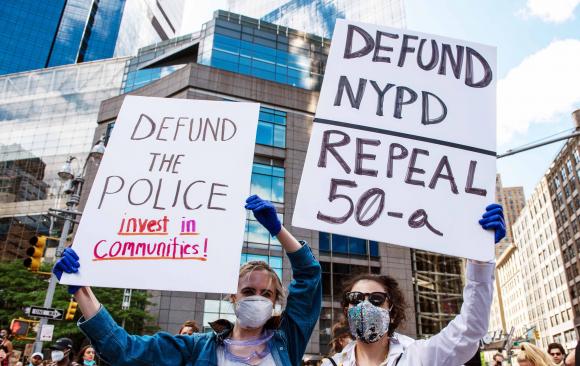


Recent tragedies and travesties have brought much needed attention to reforms that must be made to our city’s policing practices. The Metropolitan Black Bar Association, as the largest association of Black attorneys and legal professionals in New York state, advocated for the repeal of Civil Rights Law 50-a.
Gov. Cuomo signed legislation today that will prevent the NYPD and other departments in the state from keeping the public in the dark when it comes to disciplinary records. The move ushers in a new era of transparency and marks a major victory for civil rights activists in the aftermath of George Floyd’s death.
The measure — passed by the Legislature this week as part of a package of law enforcement reforms — repeals 50-a, a section of New York law dating back to 1976 that allowed police, fire and corrections departments keep disciplinary and personnel records under wraps for all employees.
In 50-a’s place, the legislation adds language that makes such records subject to Freedom of Information Law requests from journalists and the public.
For far too long, black men and women have been treated differently by our criminal justice system. There has been no better example than the injustices we have witnessed over the last few months. In Minneapolis, Minnesota, an officer used his knee to immobilize and choke George Floyd despite pleas that he could not breathe. In Louisville, Kentucky, Breonna Taylor was shot and killed by police while residing in her home.
While this most recent string of police involved fatalities of Black men and women occurred outside New York, we have our own sordid history of racially motivated fatalities. Amadou Diallo, Sean Bell, Eric Garner, Patrick Dorismond, Akai Gurley, and Ramarley Graham are just a few of the names that come to mind. Moreover, the instances of racially disparate police misconduct that do not end in death is even more prevalent. There have been more recent instances of likely misconduct. For example, on Saturday, during an anti-police brutality rally, a New York City Police Department vehicle accelerated into a crowd of protesters. Data has also shown that the NYPD issued significantly more summons and arrests to Black individuals for COVID-19 related violations than to White individuals, notwithstanding the lower percentage of Black people in the NYC population. These tragedies and travesties have brought much needed attention to reforms.
Civil Rights Law 50-a prohibits the disclosure of “personnel records,” including police performance and disciplinary records. It uniquely applies to police officers, correction officers, and firefighters. It renders “all personnel records used to evaluate performance toward continued employment or promotion…confidential and not subject to inspection or review” except by court order. The law was originally introduced by former New York State Senator Frank Padavan in 1976. According to Senator Padavan, the purpose of the bill was to protect police officers from “harassment,” and impeachment by unsubstantiated civilian complaints. It was never intended to block the disclosure of substantiated findings of police misconduct. However, caselaw has expanded protection to include such records.
Repealing this law is a first step toward restoring trust in our communities.
Over the last four years, the MBBA has organized several community town hall events on the topic of police brutality. Too often, victims of police brutality are unwilling to file a complaint or commence legal action because they are unconvinced the offending officer will be held accountable. Eliminating Civil Rights Law 50-a, or at the very least amending the law to permit the disclosure of performance and discipline related information, would help reduce these concerns and be a welcomed move toward greater transparency.
As it stands, there is no way to know if an officer you encounter has a record of police misconduct. For example, after the death of Eric Garner, several reporters requested the disciplinary record of Officer Daniel Pantaleo, the officer responsible for Mr. Garner’s death. Authorities refused to produce this information citing Civil Rights Law 50-a. It was only after Officer Pantaleo’s disciplinary record was leaked that the public was made aware that he had four substantiated allegations of abuse by the New York City Civilian Complaint Review Board.
Constance Malcolm experienced similar obstacles when she attempted to acquire the disciplinary history of Officer Richard Haste. In 2012, her son, Ramarley Graham, was shot in his own home by Officer Haste. The New York Times reported that Malcolm only learned of the officer’s extensive misconduct record after a whistleblower exposed his disciplinary record. She told The New York Times, “Haste had racked up more complaints and allegations in 13 months than 91 percent of officers accrue in their entire career.” Perhaps if Officer Haste’s disciplinary record had been made available, or he was properly held accountable for previous infractions, he never would have been in a position to shoot Ramarley Graham. Stories such as these exacerbate tensions and erode trust in our police force.
New York was one of just a handful of states that restrict misconduct records in this manner. In fact, there are 12 states where the public has full access to on-duty officers misconduct reports and there is no evidence that the heightened transparency has endangered the lives of their officers.
Likewise, New York’s Public Officer Law sufficiently protects all public employees, including police officers, from the release of home addresses, phone numbers and other information that constitutes an unlawful invasion of privacy. The MBBA recognizes and appreciates that every day members of the NYPD and other police departments throughout the state risk life and limb to protect New Yorkers. We also strongly believe in accountability and transparency; and that an equitable balance that supports all of these goals will be achieved with the repeal of Civil Rights Law 50-a.
Jason Clark is president of the Metropolitan Black Bar Association and co-host of Raising the Bar with the MBBA on MNN.
#raisingthebar